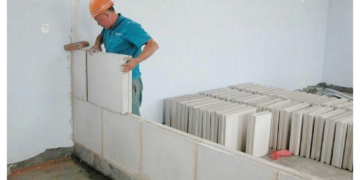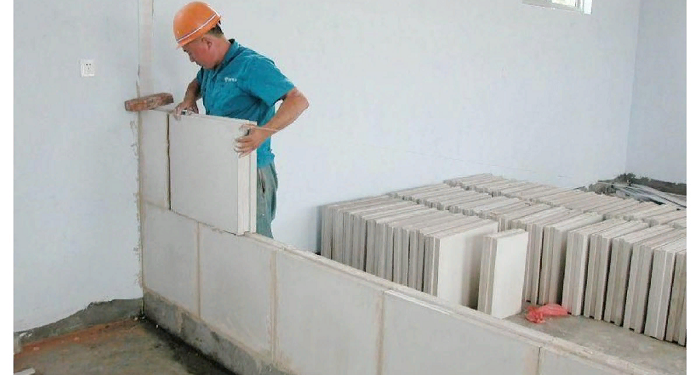With the development of construction technologies, more and more effective materials appear on the market, which are easier, simpler and more convenient to work with. Among them are tongue-and-groove slabs or tongue-and-groove blocks.
Lightweight, elementary building material in finishing is a block with grooves and ridges, due to which the elements are fixed to each other. This is an alternative to brick and plasterboard structures, which allows you to speed up the process of building internal walls and partitions and make it cheaper.
What are tongue-and-groove slabs
Tongue-and-groove slabs are rectangular products designed for the construction of load-bearing partitions and walls or other lightly loaded structures. Along the perimeter, the slab in the form of a parallelepiped has grooves and ridges, due to which the prefabricated elements are interconnected and form a wall.
Depending on the production technology, tongue-and-groove blocks are of two types: silicate and gypsum.
Silicate tongue-and-groove slabs are an autoclave-type building material made from quartz sand, quicklime and water. High temperature and pressure transform the mixture into a hardened lime-sand product.
These are non-toxic plates with a size of 500x250x70 mm. They have good strength and are not very susceptible to moisture. Suitable for the construction of interior walls and self-supporting structures in both residential and non-residential premises. Suitable for use in high humidity conditions. Partitions made of silicate-type tongue-and-groove slabs are more durable than gypsum structures.
Gypsum tongue-and-groove slabs, products cast from G-4 or G-5 gypsum. environmentally friendly, lightweight material is not as durable as silicate blocks. The density of gypsum products is about a quarter lower than that of silicate products.
But due to its light weight and convenient dimensions of 667x500x80 mm, it is faster and easier to build walls and partitions from it. Although finished products practically do not withstand additional loads, they have the best heat and sound insulation properties. Therefore, the gypsum version of the blocks is suitable for the construction of partitions in residential premises.
In addition, gypsum practically does not withstand moisture, which means that it is only suitable for dry rooms. But manufacturers offer special moisture-resistant gypsum tongue-and-groove boards. They are suitable for use even in the bathroom. Such a product can be distinguished by its characteristic green color.
And if the partition is being erected solely for the visual delimitation of space, hollow blocks can be used. The performance of such products is lower, but at the same time they have very little weight.





















